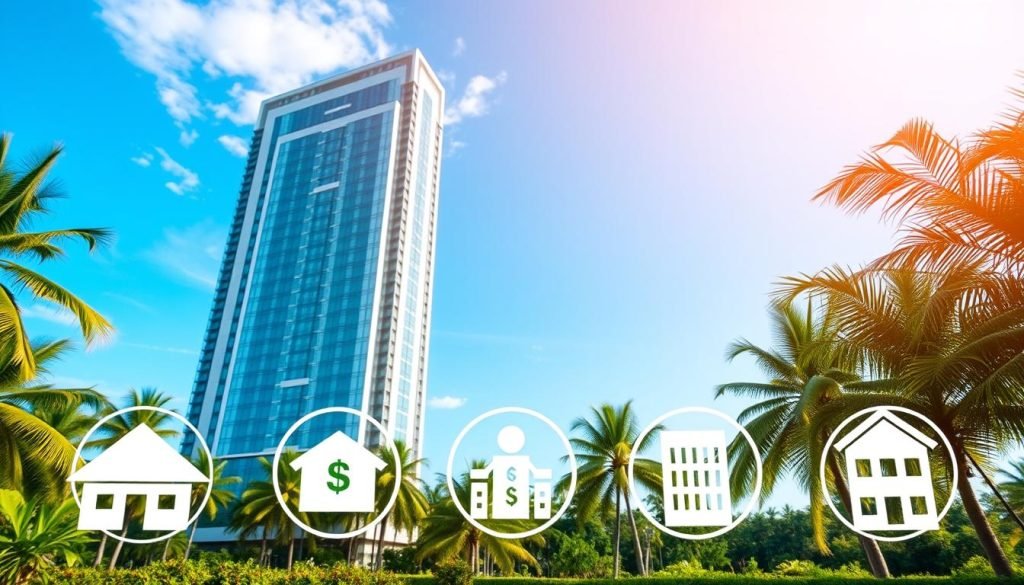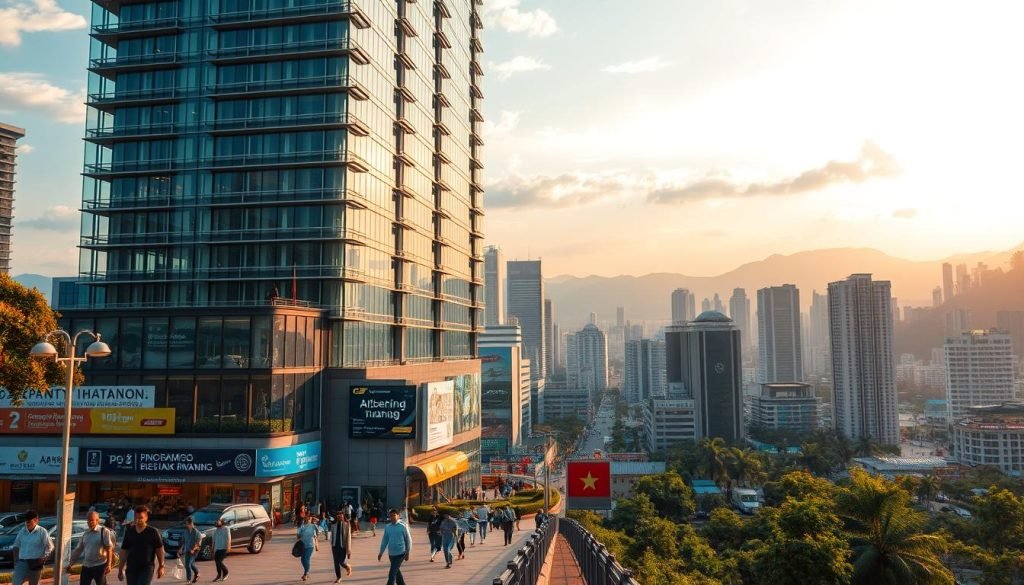How to Finance Your Property Purchase in Vietnam

Thinking about investing in Vietnam’s real estate market? Knowing your financing options is key. The country’s property sector is growing, attracting foreign investors. To make a smart choice, you need to understand your financing options.
Dealing with mortgage processes can be tough. But knowing your choices can help you decide better. This article will help you understand how to finance your property in Vietnam.
Key Takeaways
- Understanding the available financing options for property purchases in Vietnam.
- The importance of knowing the mortgage processes.
- Guidance on navigating the complexities of financing a property purchase.
- Opportunities and challenges in Vietnam’s real estate market.
- Key considerations for foreign investors.
Understanding the Vietnamese Property Market
You can make the most of the Vietnamese property market by knowing its trends and chances. The market is growing fast, thanks to foreign investment and local interest.
Current Market Trends and Investment Hotspots
The Vietnamese property market is seeing a rise in demand for luxury apartments and commercial spaces. Cities like Hanoi and Ho Chi Minh City are seeing property prices go up because of this demand.
Property Types Available to Foreign Buyers
Foreign buyers can invest in different types of properties. These include apartments, villas, and commercial properties. The government allows foreign ownership, making it simpler for international investors to get into the market.
Price Ranges Across Major Cities
Property prices differ in major cities. In Hanoi, the average price per square meter is about $1,500. In Ho Chi Minh City, it’s between $2,000 and $3,000 per square meter. Knowing these price ranges is key for smart investment choices, whether you’re looking at loans for foreigners or other Vietnam property financing options.
Legal Framework for Foreign Property Ownership
Understanding the legal side of owning property in Vietnam is key for foreign investors. Vietnam has laws that control how foreigners can own property. It’s important to know these laws before investing.
Vietnamese Laws Governing Foreign Ownership
Vietnam lets foreigners own certain properties like apartments and houses. But, there are rules to follow. The 2014 Land Law and the Law on Residential Housing 2014 are the main laws for foreign property ownership.
Land Use Rights vs. Freehold Ownership
In Vietnam, foreigners can get land use rights, not freehold ownership. Land use rights let foreigners use the land for up to 50 years. They can also be extended.

Documentation Requirements for US Citizens
US citizens must follow certain rules when buying property in Vietnam.
Necessary Permits and Certificates
Foreign buyers need to get certain permits and certificates. This includes a Certificate of Land Use Rights.
Tax Implications for American Investors
American investors should know about the taxes of owning property in Vietnam. This includes value-added tax (VAT) and personal income tax (PIT).
| Tax Type | Rate | Applicability |
|---|---|---|
| Value-Added Tax (VAT) | 10% | Applicable on property transactions |
| Personal Income Tax (PIT) | Based on income slab | Applicable on rental income |
Vietnam Property Financing Options
To buy property in Vietnam, you must know your financing options. As a foreign buyer, it’s key to understand the financing landscape well.
Local Bank Loans and Eligibility Criteria
Local banks in Vietnam give mortgage loans to foreigners. But, the rules are strict. You’ll need to show proof of income, job, and a big down payment.
International Banking Solutions for Americans
International banks in Vietnam are another option. They might have easier rules and better interest rates.
Developer Payment Plans and Incentives
Some developers have special deals to draw in buyers. These deals might include paying in installments or getting discounts for early payments.
Interest Rates and Repayment Terms
Property loan interest rates in Vietnam are 8-12% a year. Repayment terms usually last 10 to 20 years.
| Financing Option | Interest Rate | Repayment Term |
|---|---|---|
| Local Bank Loan | 8-10% | 10-15 years |
| International Bank Loan | 9-12% | 15-20 years |
| Developer Payment Plan | 0-8% | 5-10 years |
Down Payment Requirements and Calculations
Down payments can be 30% to 50% of the property’s price. It’s important to check these requirements to plan your budget.
A financial expert says, “Knowing your loan’s terms and conditions is key to avoid financial trouble.”
Alternative Financing Strategies
Foreign investors need to know about different ways to finance property in Vietnam. Traditional loans might not work for everyone.
Partnering with Vietnamese Nationals
Working with Vietnamese locals is a good option. They can help with local knowledge and connections. Make sure to have a clear agreement about what each person will do.
Establishing a Vietnamese Investment Company
Starting a Vietnamese company can open up more financing choices. It might also save on taxes. But, you must follow all the rules and know the legal side well.
Lease-to-Own Arrangements
Lease-to-own is a great choice for foreign buyers. It lets you own the property slowly.
Equity Sharing Models
Equity sharing means sharing costs and risks with other investors. It’s good for big or expensive properties.
Remote Investor Considerations
Remote investors should keep up with market and legal updates. Getting help from local experts is key to success.

Step-by-Step Guide to Securing Financing
Getting a loan for a property in Vietnam can seem hard, but it’s doable with the right help. Knowing the steps to get a loan or other financing is key.
Preparing Your Financial Documentation
To begin, gather your financial papers. This includes proof of income, bank statements, and ID. Make sure your documents are current and show your financial health. Foreigners might need a certificate of income or a letter from their employer.
Approaching Vietnamese and International Banks
With your documents ready, you can talk to Vietnamese and international banks. Look for banks with the best property loan deals. Some banks have special offers for foreigners, so ask about those.
Negotiating Favorable Terms and Conditions
After getting loan offers, you’ll need to talk about the terms. This includes the interest rate, how long you’ll pay it back, and how you’ll make payments. Read the loan agreement carefully to know all the details.
Managing Currency Exchange Risks
For buyers from abroad, watching currency exchange is important. Fluctuations in exchange rates can affect your payments. Think about using hedging or fixing your loan in a stable currency.
Navigating International Money Transfers
Handling money transfers across borders needs understanding of rules and fees. Use a trusted transfer service to save money and follow Vietnamese laws.
Working with Property Attorneys
Lastly, having a property attorney can make things smoother. They help with the legal side of buying property in Vietnam.
Conclusion
You now know a lot about the Vietnamese property market and how to finance your purchase. To buy property in Vietnam, you need to understand the local laws and explore different financing options. You should also think about other ways to get the money you need.
There are many ways to finance your property in Vietnam. You can get a loan from a local bank or use international banking services. You might also look into developer payment plans or partner with Vietnamese nationals. Another option is to start a Vietnamese investment company to get the funds you need.
Knowing about mortgage options and loan requirements helps you make smart choices. With the right advice and plan, you can invest in Vietnam’s property market with confidence. This will help you reach your investment goals.
FAQ
What are the financing options available for foreigners buying property in Vietnam?
Foreigners can look into local bank loans, international banking options, and developer payment plans. These are ways to finance property purchases in Vietnam.
Can US citizens own property in Vietnam?
Yes, US citizens can own property in Vietnam. But, there are rules and requirements. They need a land use rights certificate and must follow Vietnamese laws on foreign ownership.
What are the eligibility criteria for local bank loans in Vietnam?
To get a local bank loan in Vietnam, you need a stable income and good credit history. You also need a big enough down payment.
How do I navigate the process of securing financing for a property purchase in Vietnam?
First, prepare your financial documents. Then, talk to Vietnamese and international banks. Negotiate the best terms and conditions you can get.
What are the benefits of partnering with Vietnamese nationals when buying property in Vietnam?
Working with Vietnamese nationals can help a lot. They know the local property laws well. They can also help with financing and make the process smoother.
What are the tax implications for foreign property owners in Vietnam?
Foreign property owners in Vietnam face different taxes. These include value-added tax, income tax, and property tax. It’s wise to talk to a tax expert to understand your tax duties.
Can I use a Vietnamese investment company to finance my property purchase?
Yes, using a Vietnamese investment company is an option. But, you must follow Vietnamese laws and regulations carefully.
How do I manage currency exchange risks when financing a property purchase in Vietnam?
To handle currency exchange risks, consider hedging strategies. Options like forward contracts or currency options can help. Also, choose financial institutions with good exchange rates.





